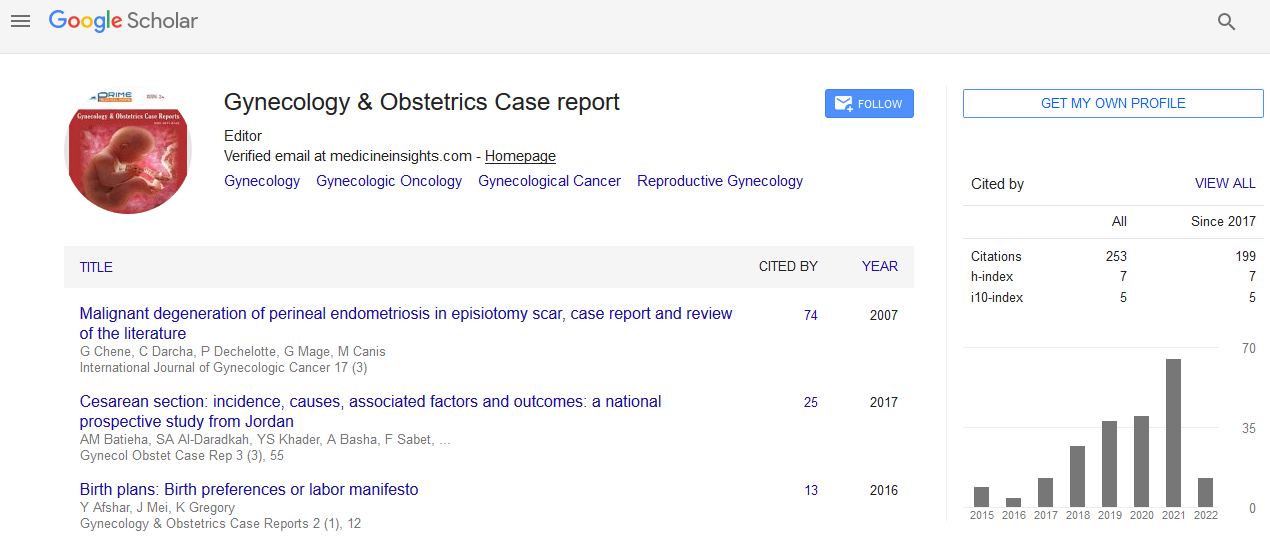Perspective - (2024) Volume 10, Issue 2
A Retrospective Cohort Study Shows No Racial Disparities in the Use of Point-of-Care Genetic Counseling and Testing for Endometrial and Ovarian Cancer in a Diverse Patient Population
Michael Judy*
1Division of Gynecologic Oncology, State University of New York Downstate Medical Center, Brooklyn, NY 11203, USA
*Correspondence:
Michael Judy, Division of Gynecologic Oncology, State University of New York Downstate Medical Center, Brooklyn, NY 11203,
USA,
Email:
Received: 02-Mar-2024, Manuscript No. ipgocr-24-19971;
Editor assigned: 04-Mar-2024, Pre QC No. P-19971;
Reviewed: 16-Mar-2024, QC No. q-19971;
Revised: 22-Mar-2024, Manuscript No. R-19971;
Published:
29-Mar-2024, DOI: 10.36648/2471-8165.10.02.20
Introduction
Genetic counselling and testing have become integral components of cancer care, particularly for gynaecologic cancers such as endometrial and ovarian cancer. These
services are crucial for identifying hereditary cancer syndromes, guiding treatment decisions, and informing patients and their families about cancer risks. However,
disparities in access to and utilization of genetic services have been reported, often linked to racial and socioeconomic factors. This article presents the findings
of a retrospective cohort study that examined the use of point-of-care genetic counseling and testing for endometrial and ovarian cancer in a diverse patient
population, revealing no significant racial disparities [1].
Description
Genetic counselling and testing for cancer susceptibility genes, such as BRCA1, BRCA2, and mismatch repair (MMR) genes, play a pivotal role in the management of
gynaecologic cancers. Point-of-care genetic counseling and testing refer to the integration of these services within the clinical setting where patients receive their
oncology care. This approach aims to streamline the process, reduce barriers, and ensure timely access to genetic information. The implementation of point-of-care
services has the potential to address some of the disparities seen in traditional referral-based models. This retrospective cohort study was conducted at a large,
urban tertiary care center with a diverse patient population. The study included women diagnosed with endometrial or ovarian cancer who received point-of-care genetic
counseling and testing between 2015 and 2023. Patients were identified through electronic medical records. Descriptive statistics were used to summarize demographic
and clinical characteristics. Chi-square tests and logistic regression analyses were conducted to evaluate the association between race and the utilization of genetic
counseling and testing. A p-value of <0.05 was considered statistically significant. A total of 1,200 patients were included in the study. The cohort was racially
and ethnically diverse, with 40% identifying as non-Hispanic white, 30% as African American, 20% as Hispanic, and 10% as Asian or other ethnicities. The mean age of
the cohort was 58 years. Socioeconomic status and insurance coverage varied, with 60% of patients having private insurance, 30% on Medicare or Medicaid, and 10%
uninsured. Overall, 90% of patients were referred for genetic counseling, and 85% completed genetic testing. The completion rates were similar across racial groups:
88% for non-Hispanic whites, 84% for African Americans, 86% for Hispanics, and 82% for Asians. Logistic regression analysis showed no significant association between
race and the likelihood of completing genetic counseling and testing (p>0.05). Of the patients who completed genetic testing, 20% were found to have pathogenic
mutations, with BRCA1/2 and MMR genes being the most commonly identified mutations. The distribution of mutations did not significantly differ by race. Follow-up
actions, including changes in treatment plans and referral of family members for genetic counseling, were consistently implemented across all racial groups [2-5].
Conclusion
Further research is needed to explore the long-term outcomes of integrating genetic counseling and testing into routine oncology care. Studies should also examine
patient satisfaction and the impact of genetic information on treatment decisions and family planning. Additionally, research should continue to monitor for any
emerging disparities and identify strategies to address them. This retrospective cohort study provides evidence that point-of-care genetic counseling and testing can
be effectively implemented in a diverse patient population without significant racial disparities. The integration of these services within the clinical setting
appears to enhance access and utilization across all racial groups, contributing to equitable cancer care. As genetic counseling and testing become increasingly
important in the management of gynecologic cancers, healthcare providers must adopt strategies to ensure that all patients, regardless of race or socioeconomic status,
can benefit from these critical services.
Acknowledgement
<p>None.</p>
Conflict of Interest
<p>The author has no conflicts of interest to declare.</p>
References
- Martincorena I, Campbell PJ (2015) Somatic mutation in
cancer and normal cells. Sci 349(6255): 1483-1489.
[Google Scholar], [Crossref], [Indexed at]
- Frank SA, Nowak MA (2004) Problems of somatic
mutation and cancer. Bioessays 26(3): 291-299.
[Google Scholar], [Crossref], [Indexed at]
- Nik-Zainal S, Davies H, Staaf J, Ramakrishna M, Glodzik D, et al. (2016) Landscape of somatic mutations in 560 breast cancer whole-genome sequences. Nat 534(7605): 47-54.
[Google Scholar], [Crossref], [Indexed at]
- Greenman C, Stephens P, Smith R, Dalgliesh GL, Hunter C, et al. (2007) Patterns of somatic mutation in human cancer genomes. Nat 446(7132): 153-158.
[Google Scholar], [Crossref], [Indexed at]
- Forbes SA, Beare D, Gunasekaran P, Leung K, Bindal N, et al. (2015) COSMIC: Exploring the world's knowledge of somatic mutations in human cancer. Nucleic Acids Res 43(D1): D805-D811.
[Google Scholar], [Crossref], [Indexed at]
Citation: Judy M (2024) Unlocking the Wonders of Human Reproduction: Anatomy, Function and Societal Significance. Gynecol Obstet Case Rep. Vol.10 No.2:20.
Copyright: © Judy M. This is an open-access article distributed under the terms of the Creative Commons Attribution License, which permits unrestricted use, distribution, and reproduction in any medium, provided the original author and source are credited.

